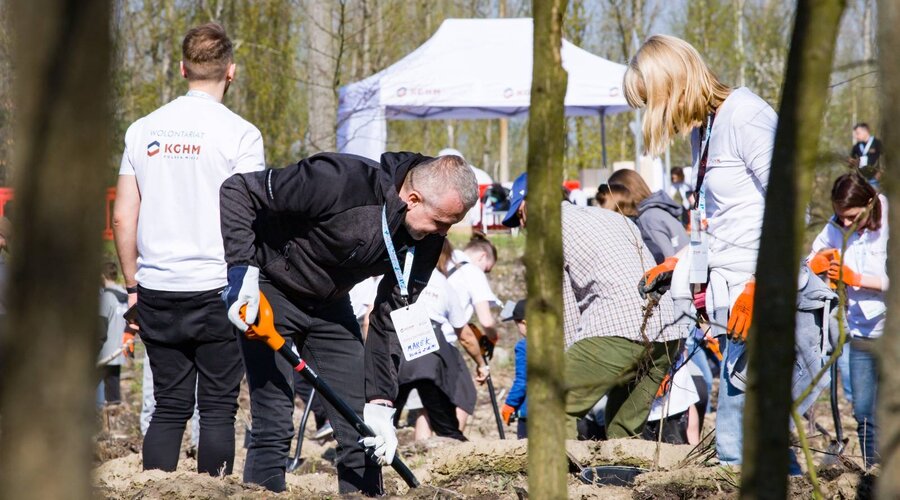Thousands of oak trees from KGHM on International Earth Day
Nearly 30,000 kg of CO2 per year will be absorbed by trees planted on International Earth Day by KGHM volunteers - employees of the company and students from our umbrella schools. Oak seedlings will grow near the Głogów smelter. This is part of the afforestation work carried out by the copper company each year. Last year alone, KGHM planted over 600 thousand trees. The forests on the site of the smelter will in future meet the oxygen needs of more than 2 million people!
ECOLOGY IN THE STRATEGY
Planting and afforestation is only part of the pro-environmental activities carried out by KGHM, in which employees of the copper company and their families, as well as pupils of our umbrella schools from the "Competent in the Mining and Smelting Industry" programme, eagerly joined. Equipped with spades and seedlings, they turned an empty space next to the Głogów smelter into a young forest, which in a few years will become a real forest.
"Today's planting is only a drop in the sea of what KGHM does for the environment. We are aware that our activities have an impact on the environment, and that we are tapping into the Earth's precious resources. That is why we work responsibly, supply raw materials without which it is not possible to halt climate change and engage in environmental protection. Last year we spent almost a quarter of a billion PLN on environmentally-friendly investments," said Marek Świder, Vice President of the Management Board of KGHM for Production, who participated in the planting campaign.
Environmental tasks and obligations for KGHM are specified by the environmental and climate policies adopted in the company. In accordance with the latter, the copper giant aims to achieve climate neutrality by 2050. Ecology is also one of the pillars of KGHM's current strategy.
KGHM is systematically converting poplar plantings to deciduous and long-lived stands, which provide the greatest amount of oxygen to the environment. It plants oaks and beeches as the main forest-forming species and supplements them with lime, maple or larch seedlings. The company also participates in the so-called 'Forest Carbon Farms' project, the idea of which is to convert forests and introduce new afforestation in order to reduce the presence of carbon dioxide in the atmosphere by increasing the CO2 absorption of forest complexes.
HECTARES FOR NATURE
The forest areas next to the Głogów smelter were created in the former protective zone. At present, it covers more than 872 hectares and is a kind of "ecological niche" where birds nest, animals live and vegetation grows luxuriantly. In addition, they are a natural air filter by absorbing and neutralising harmful compounds.
1 ha of forest, depending on the species and age of the trees growing in it, produces around 700 kilograms of oxygen per day. This is the daily requirement for 2,500 people.
Forests also play a very important role in carbon sequestration. According to research, one tree absorbs approximately 6-7 kg of CO2 annually, and one hectare of forest is equivalent to the annual exhaust emissions of four passenger cars. This means that the forests belonging to KGHM's Głogów smelter will absorb the exhaust fumes emitted by more than 3 000 vehicles in a year.



